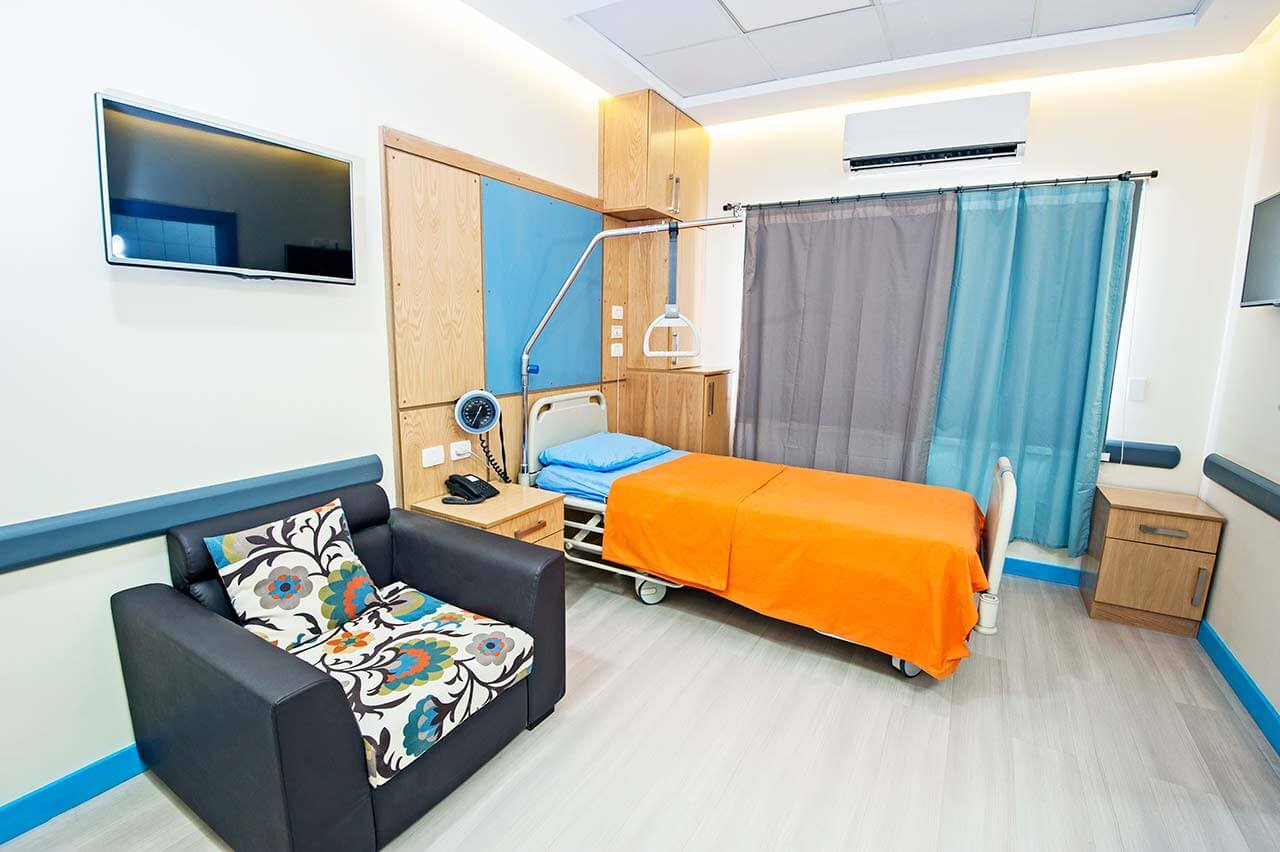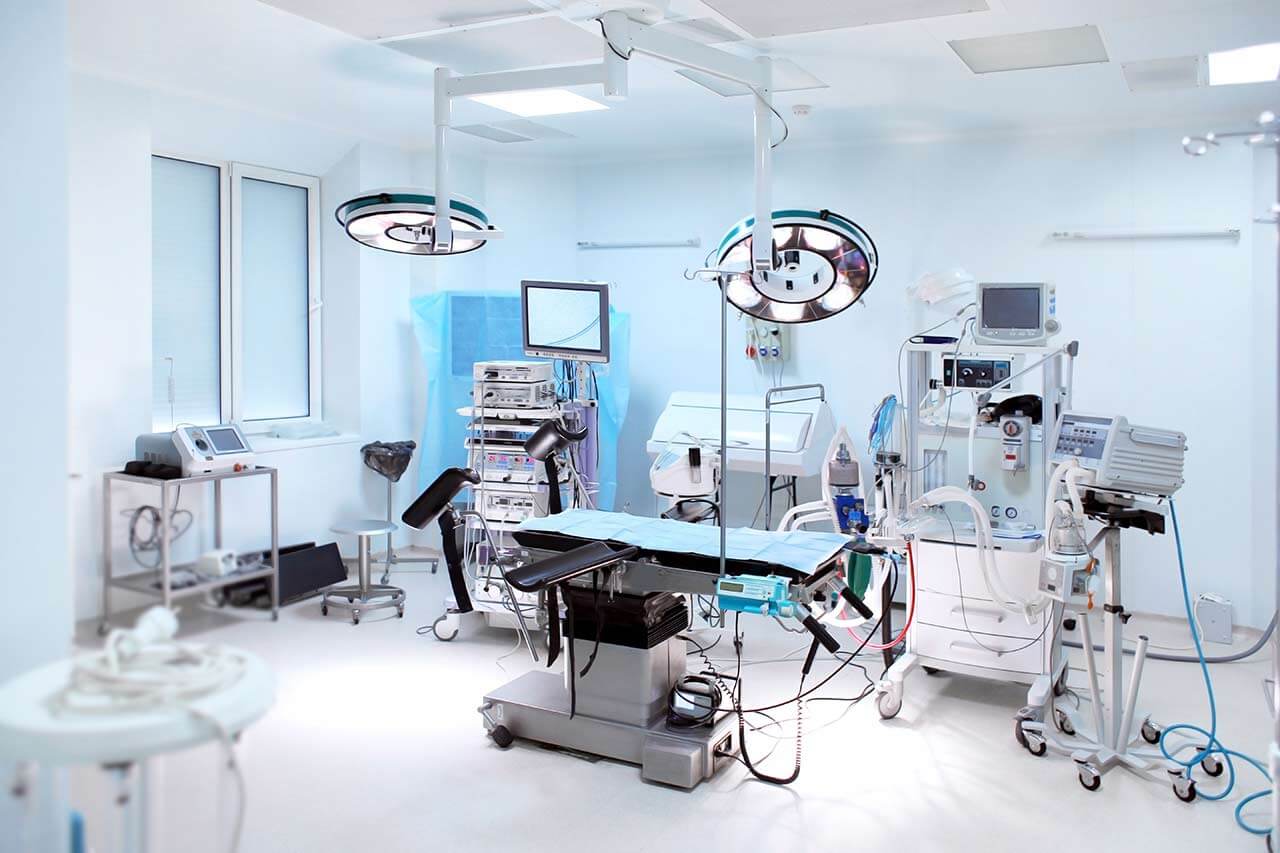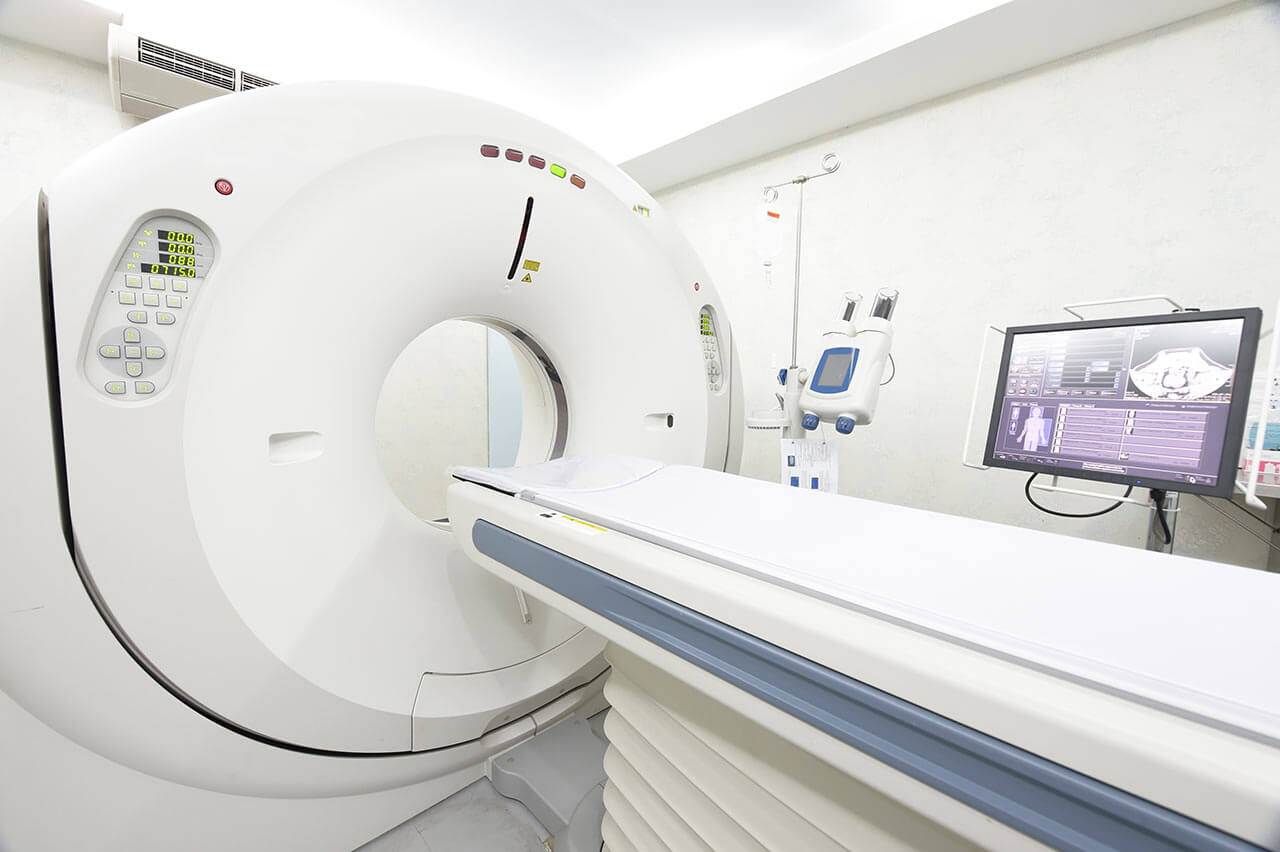
The program includes:
- Initial presentation in the clinic
- clinical history taking
- physical examination
- review of medical records
- laboratory tests:
- complete blood count
- general urine analysis
- biochemical analysis of blood
- TSH-basal, fT3, fT4
- indicators of inflammation (CRP, ESR)
- indicators blood coagulation
- abdominal ultrasound
- CT/MRI abdomen
- preoperative care
- rectocele resection
- symptomatic treatment
- control examinations
- the cost of essential medicines and materials
- nursing services
- nutrition recommendations
- full hospital accommodation
- explanation of future recommendations
Required documents
- Medical records
- Transvaginal ultrasound (if available)
- CT scan of the abdomen and pelvis (if available)
Service
You may also book:
 BookingHealth Price from:
BookingHealth Price from:
About the department
The Department of Abdominal and Colorectal Surgery, Hepatobiliary Surgery, Hernia Surgery, Bariatric Surgery, Endocrine Surgery, Thoracic and Vascular Surgery at the University Hospital Carl Gustav Carus Dresden offers the full range of services in these medical fields. It provides surgical treatment of diseases of the gastrointestinal tract, thyroid and parathyroid glands, thoracic organs, vascular system, rectum, anus and colon. In addition, the department performs bariatric interventions for the treatment of morbid obesity. A special focus is made on the treatment of gastrointestinal cancer. Minimally invasive surgical techniques are always preferred, if clinically indicated. The team of the department's surgeons has 8 progressive operating rooms equipped with everything necessary for successful treatment. The department also has the da Vinci Xi surgical system for high-precision minimally invasive robot-assisted interventions. The patient's health is in the safe hands of the best German surgeons who have gone through a rigorous selection and have vast clinical experience. The department is headed by Prof. Dr. med. Jürgen Weitz.
Since 2014, the department has been a certified Gastrointestinal Cancer Center. The very latest diagnostic and therapeutic techniques are practiced and implemented here to ensure optimal medical care for patients with malignant tumors of the stomach, esophagus, small and large intestine, rectum, liver, biliary tract, and abdominal soft tissues. Of particular interest is pancreatic cancer treatment.
A special focus in the department is on vascular and endovascular surgery. About 75% of all vascular interventions are performed using a combined open and endovascular technique, or using endovascular technique (namely, a catheter) alone. The range of medical services includes all open and interventional surgical options for the optimal treatment of artery and vein pathologies – from varicose veins or "window shopper's disease" to endovascular and open surgeries on the arteries of internal organs, thoracic and abdominal aorta, as well as aortic arch.
In the field of thoracic surgery, the experienced department's specialists practice all modern surgical techniques for the treatment of diseases of the lungs, thoracic wall and mediastinal organs. The treatment of pulmonary diseases mostly involves the use of an innovative sparing surgical technique – video-assisted thoracoscopic surgery (VATS). This method avoids a traumatic thoracotomy, which is required in case of classic open surgery.
The department's colorectal surgeons are responsible for the treatment of hemorrhoids, rectal prolapse, anal fissures, anal abscesses and fistulas. The first-line treatment is drug therapy, but if medications do not give a satisfactory result, then surgery is prescribed to the patient.
The department's surgical options are complemented by bariatric interventions for the treatment of morbid obesity, hepatobiliary interventions for the treatment of liver, gallbladder and biliary tract diseases, as well as operations for the treatment of endocrine glands. In addition, the department's team of surgeons has successful experience in the surgical treatment of inguinal, umbilical, and incisional hernias. Preference is always given to sparing minimally invasive techniques that exclude extensive skin and soft tissue incisions.
The department's main clinical focuses include:
- Abdominal surgery
- Minimally invasive surgery, interventions using the da Vinci surgical system
- Liver resection (also for cancers)
- Pancreatic resection (also for cancers)
- Stomach resection (also for cancers)
- Colon resection (also for cancers)
- Rectal resection (also for cancers)
- Fundoplication
- Splenectomy
- Adrenalectomy
- Appendectomy
- Cholecystectomy
- Transabdominal preperitoneal hernia repair
- Total extraperitoneal hernia repair
- Intraperitoneal mesh overlay for incisional hernia
- Cardiomyotomy
- Esophagus and stomach surgery
- Esophageal diverticulum removal
- Thoracoabdominal esophageal resection
- Subtotal and total gastrectomy
- Billroth I or II resection
- Fundoplication
- Ulcer treatment
- Gastroenterostomy
- Jejunostomy
- Pancreatic surgery
- Pancreatic head resection with pylorus preservation or a Whipple procedure
- Extended pancreatic resection with vascular reconstruction or prosthetics
- Pancreatotomy
- Pancreatic head resection with duodenal preservation
- Cystic tumor enucleation
- Pancreatic islet transplantation
- Spleen surgery
- Splenectomy (open or laparoscopic)
- Soft tissue surgery
- Regional lymph nodes (armpit, groin) removal
- Soft tissue tumor biopsy
- Resection of soft tissue tumors on the body and limbs
- Lymph node removal
- Hyperthermic intraperitoneal chemotherapy (HIPEC) for colorectal cancer, stomach cancer, ovarian cancer, and pseudomyxoma peritonei
- Minimally invasive surgery, interventions using the da Vinci surgical system
- Hepatobiliary surgery
- Extended hemihepatectomy, left or right hepatectomy
- Extended or partial liver resection with vena cava prosthetics
- Bilateral liver resection
- Portal venous embolization, In-Situ-Split technique
- Liver resection with combined use of ablation techniques
- Segmental resection
- Laparoscopic examinations and liver biopsy
- Application of biliodigestive anastomosis
- Radiofrequency ablation (percutaneous or open surgery)
- Colorectal surgery
- Deep anterior rectal resection
- Rectal extirpation
- Sigmoid colon resection
- Hemicolectomy (right- and left-sided, extended)
- Colostomy placement
- Surgical interventions in patients with inflammatory bowel disease
- Hemorrhoidectomy
- Laparoscopic rectopexy
- Anal fistula removal
- Anal abscess treatment
- Bariatric surgery
- Gastric bypass surgery
- Laparoscopic sleeve gastrectomy
- Endocrine surgery
- Thyroidectomy
- Parathyroidectomy
- Adrenalectomy
- Hernia surgery
- Inguinal hernia herniotomy
- Umbilical hernia herniotomy
- Incisional hernia herniotomy
- Thoracic surgery
- Pneumonectomy with radical lymphadenectomy
- Lung lobe resection with radical lymphadenectomy
- Segmental or atypical lung lobe resection
- Mediastinoscopy with biopsy or lymph node removal
- Diagnostic and therapeutic video-assisted thoracoscopic surgery (VATS)
- Surgical removal of bronchial carcinoma
- Minimally invasive thoracic surgery
- Robot-assisted thoracic surgery
- Surgical removal of lung metastases (including laser surgery)
- Thoracic wall and diaphragmatic tumor removal
- Mediastinal tumor removal
- Emergency surgical care for injuries and infections
- Septic thoracic surgery
- Vascular surgery
- Surgery for occlusive peripheral arterial disease
- Surgery for acute circulatory disorders of the lower extremities, embolism in the upper and lower extremities
- Surgery for intestinal artery stenosis (chronic abdominal ischemic disease)
- Surgery for varicose veins
- Surgery for aneurysms
- Formation of vascular access for dialysis
- Surgery for supra-aortic vascular pathologies
- Surgery for aortic pathologies
- Surgery for deep vein thrombosis, phlegmasia, pathologies of the internal iliac arteries
- Surgery for carotid artery stenosis
- Other medical services
Curriculum vitae
Academic Degrees
- 1986 - 1993 Doctor of Medicine, Heidelberg University, Germany, and Duke University, Durham, USA.
- 2004 - 2005/2006 Master of Science in Healthcare Management, Heidelberg University.
Medical Training
- 11.1993 - 04.1995 Internship, Department of Surgery, Heidelberg University, Germany.
- 05.1995 - 10.2000 Resident, Department of Surgery, Heidelberg University, Germany.
- 12.1999 Board certification in Surgery.
- Since 05.2001 Practicing Surgeon, Department of Surgery, Heidelberg University, Germany.
- 07.2001 Board certification in esophagogastroduodenoscopy.
- 07.2001 - 12.2002 Scholarship, Cancer Surgery, Memorial Sloan Kettering Cancer Center, New York, USA.
- Since 01.2004 Head of the Department of Cancer Surgery and Deputy Head of the Department of Kidney Transplantation, Heidelberg University, Germany.
- 03.2005 Board certification in Abdominal Surgery.
- 04.2005 Board certification in Surgical Intensive Care.
- 01.2006 - 12.2006 Clinical Rotation in Vascular Surgery, Department of Vascular Surgery, Heidelberg University, Germany.
- 07.2009 Head Physician in the Department of Surgery, Heidelberg University, Germany.
- 08.2011 Deputy Head of the Transplant Surgery Unit, Department of Surgery, Heidelberg University, Germany.
- Since 09.2012 Head of the Department of Abdominal and Colorectal Surgery, Hepatobiliary Surgery, Hernia Surgery, Bariatric Surgery, Endocrine Surgery, Thoracic and Vascular Surgery at the University Hospital Carl Gustav Carus Dresden.
Academic Activities
- 1993 Doctoral thesis, Heidelberg University (under the direction of Prof. H. zur Hausen), German Cancer Research Center, Heidelberg, work on the human papillomavirus and its interaction with the host cell.
- 2001 Habilitation in Surgery, Heidelberg University, work on disseminated tumor cells in colorectal carcinoma.
- 2005 Professor of Surgery, Heidelberg University.
- Since 2005 Head of the Department of Molecular Oncology, Department of Surgery, Heidelberg University, Germany.
- Since 2009 Head of KFO 227 (from primary tumor progression to metastases), Working Group of the German Research Foundation.
- 12.2011 Professor of Cancer Surgery, Department of Surgery, Heidelberg University, Germany.
Qualifications and Board Certifications
- Board certification in Surgery, Abdominal Surgery.
- Surgical Intensive Care.
- Emergency Medical Care.
- Surgical training in Vascular Surgery (Department of Vascular Surgery, Heidelberg University).
- Scholarship, Cancer Surgery, Memorial Sloan Kettering Cancer Center, New York, USA.
Clinical Interests
- Abdominal Surgery: Hepatobiliary Surgery, Pancreatic Surgery, Esophageal and Gastric Surgery, Colorectal Surgery, Endocrine Surgery.
- Cancer Surgery.
- Transplantation Surgery.
- Minimally Invasive Surgery.
Scientific Interests
- Tumor progression, tumor immunology and angiogenesis in colorectal and pancreatic cancer.
- Clinical research in abdominal surgery, transplantation surgery and cancer surgery.
- Meta-analyzes.
Memberships in Scientific Societies
- German Society of Surgery, Section of Oncology.
- German Society of General and Visceral Surgery.
- German Cancer Society.
- Society of Surgical Oncology.
- German Society for Gastroenterology, Digestive and Metabolic Diseases.
- International Hepato-Pancreato-Biliary Association.
- Fellowship of the Royal College of Surgeons.
Photo: (с) depositphotos
About hospital
According to the reputable Focus magazine, the University Hospital Carl Gustav Carus Dresden ranks among the top five German hospitals!
The hospital is the benchmark for modern high-quality medicine. Positioning itself as a maximum care medical facility, the hospital represents all medical fields. There are 26 specialized departments, 6 institutes and 17 interdisciplinary centers, which cooperate closely with the clinical and scientific facilities of the Faculty of Medicine. The basis of successful practice is excellent equipment, which is regularly updated, as well as highly qualified, experienced medical personnel: world famous doctors and professors work here for the benefit of patients.
In addition to its main goal of caring for patients, the hospital is also active in training and professional development of medical personnel, as well as in the field of public health care. The priority focus of the work is research activity, which allows the doctors to introduce the innovative diagnostic and therapeutic techniques into clinical practice.
A special feature of the hospital is also the diagnostics and treatment of rare diseases. State-of-the-art equipment and well-coordinated work of doctors of various medical specialties make it possible to timely recognize pathologies rarely encountered in medical practice and select the most effective therapy. Specialization in rare diseases include neurology, endocrinology, hematology/oncology, and rare autoimmune diseases.
The hospital has 1,410 beds for patient hospitalization. About 55,900 inpatients and more than 233,975 outpatients undergo treatment here annually. A large medical team, consisting of about 1,000 highly qualified doctors, as well as over 2,000 nursing staff take care of the patients' health. Each patient is guaranteed an individual approach and the most effective treatment in accordance with current clinical protocols.
It should be noted that the university hospital enjoys an impeccable reputation not only in Germany, but also far beyond its borders, including Arab countries, post-Soviet states, Great Britain and the United States. Patients from different parts of the world come here for high-quality treatment for diseases of any severity. The highest credit of patient confidence is the main indicator of the fruitful work of doctors.
Photo: (с) depositphotos
Accommodation in hospital
Patients rooms
The patients of the University Hospital Carl Gustav Carus Dresden live in comfortable rooms made in bright colors and equipped with everything necessary. The standard patient room includes an automatically adjustable bed, a bedside table with a sliding table, a wardrobe, a telephone and a TV. There is also Wi-Fi (free) in the patient rooms.
If desired, patients may live in enhanced comfort patient rooms. These patient rooms have a more sophisticated design, upholstered furniture and a safe for storing valuables.
Meals and Menus
The patients of the hospital are offered a tasty, healthy and varied three meals a day. The menu is based on local cuisine and seasonal food. If you for some reason do not eat certain products, please inform the medical staff of the hospital in advance, and you will be offered an individual menu. The nutrition provided in the hospital is certified in accordance with the quality standards of the German Nutrition Society (DGE) for catering in German hospitals.
Further details
Standard rooms include:
Religion
The religious services are available upon request.
Accompanying person
Your accompanying person may stay with you in your patient room or at the hotel of your choice during the inpatient program.
Hotel
You may stay at the hotel of your choice during the outpatient program. Our managers will support you for selecting the best option.
The hospital offers a full range of laboratory diagnostic procedures (general, hormonal, tests for tumor markers, infections, antibodies, etc.), genetic tests, various modifications of ultrasound scans, CT scans, MRI and PET / CT, angiography, myelography, biopsy and other examinations. Treatment with medications, endoscopic and robotic operations, stereotaxic interventions is carried out here, modern types of radiation therapy are also used. The hospital offers patients all the necessary therapeutic techniques.
- Cochlear implantation
- Deep brain stimulation
- Treatment of benign prostatic hyperplasia with green laser
- Da Vinci prostatectomy
- Bone marrow transplantation
These are head and neck tumors, hearloss, amyotrophic lateral sclerosis, epilepsy, Parkinson disease, infertility, malignant tumors of the reproductive system, congenital anomalies of the genital organs and the urinary system, urinary incontinence, blood clotting disorders, leukemia and other pathologies.
- Otolaryngology (Center for Cochlear Implantation)
- Neurology and Epileptology
- Urology
- Oncology
- Gastroenterology and Hepatology
About 1,000 highly qualified doctors work at the hospital.





